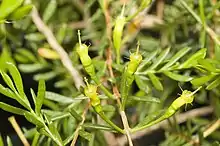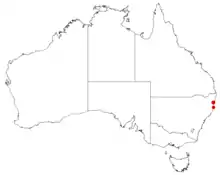Homoranthus floydii
Homoranthus floydii is a plant in the myrtle family Myrtaceae and is endemic to New South Wales.[2]
| Homoranthus floydii | |
|---|---|
 | |
| Homoranthus floydii in the ANBG | |
| Scientific classification | |
| Kingdom: | Plantae |
| Clade: | Tracheophytes |
| Clade: | Angiosperms |
| Clade: | Eudicots |
| Clade: | Rosids |
| Order: | Myrtales |
| Family: | Myrtaceae |
| Genus: | Homoranthus |
| Species: | H. floydii |
| Binomial name | |
| Homoranthus floydii | |
 | |
| Occurrence data from AVH | |
Description
Homoranthus floydii is easily distinguished from all other species of Homoranthus by its erect habit, shiny leaves that appear more pointed near the stem and rounded at the tip, long gaps between leaf nodes and particularly long flower stems. Flowering occurs from August to November and fruits mature from September to December.[3]
Taxonomy and naming
Homoranthus floydii was first formally described in 1991 by Lyndley Craven and S.R Jones and the description was published in Australian Systematic Botany.[4] The specific epithet (floydii) honours the Australian botanist, Alexander Floyd.[5]
Distribution and habitat
Endemic to the Glenreagh district of north-eastern New South Wales, H. floydii grows on shallow rocky soils derived from sandstone in shrubby woodland.[3]
Conservation status
This is a rare species with a restricted distribution and given an appropriated ROTAP conservation code of 2RC-t (Briggs and Leigh 1996).[3]
References
- "Homoranthus floydii". World Checklist of Selected Plant Families (WCSP). Royal Botanic Gardens, Kew.
- Harden, Gwen J. "Homoranthus floydii". Royal Botanic Garden Sydney. Retrieved 21 August 2018.
- Copeland, Lachlan M.; Craven, Lyn A.; Bruhl, Jeremy J. (2011). "A taxonomic review of Homoranthus (Myrtaceae: Chamelaucieae)". Australian Systematic Botany. 24 (6): 351. doi:10.1071/SB11015.
- "Homoranthus floydii". APNI. Retrieved 21 August 2018.
- "Floyd, Alexander Geoffrey (1926 - )". Australian National Herbarium. Retrieved 21 August 2018.